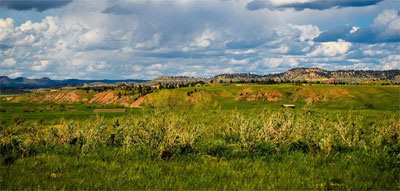As protesters occupy New Orlean’s Superdome today to stop new oil lease sales in the Gulf of Mexico, others are celebrating that big coal has moved out of Montana.
Bankrupt Arch Coal withdrew from Montana, where it’s been trying to get a permit to strip mine 1.6 billion tons of coal and export it through Pacific Northwest ports.
While the state’s environmental agency says it postponed the permit because of concerns about water supplies (coal ash has already been found in the water), Senator Daines (R-MT) blames Obama’s "war on domestic energy production."
Arch says it pulled out because of deteriorating conditions in coal markets and the difficulty of getting a permit, which is it at least partially due to years of opposition from local ranchers, farmers, tribal leaders, and community advocates.
"Montana’s beautiful Otter Creek country will be spared from the ravages of surface mining, and local tribes and ranchers can continue their way of life. And thanks to the success of all those across the US who are moving this country beyond coal, it’s less likely that the coal industry will be back to make a grab for this place any time soon," says Mary Anne Hitt, Director of Sierra Club’s Beyond Coal Campaign.
 credit: Alexis Bonogofsky
credit: Alexis Bonogofsky
Members of the Northern Cheyenne Tribe formed an organization called ecoCheyenne to fight the mine.
"This is a major victory for our homelands, the people and future generations," says Vanessa Braided Hair, co-founder of ecoCheyenne. "Arch Coal’s permanent removal of their permit application means there is hope — hope for our people and our Cheyenne way of life."
The victory also likely means the end of Tongue River Railroad, which would transport the coal to mammoth, new export terminals along the Columbia River in Washington. The railroad faces opposition along the entire route, and in the Pacific Northwest, activists are fighting Millennium Bulk Terminals, as they did (and won) in Portland, Oregon.
About 40% of the coal consumed in the US comes from the Powder River Basin in Montana and Wyoming.
What’s the next stop for Arch Coal?
The Forest Service is accepting comments through April on whether to allow Arch to expand in Colorado by building roads and well pads in a designated "roadless forest," in Gunnison National Forest.
Roadless areas are there to protect wildlife. The Sunset Roadless Area provides crucial winter habitat for big game herds, denning for the rare Canada lynx, and watersheds that support imperiled Colorado River cutthroat trout.
In 2014, a judge ruled against the expansion, using climate change as the reason for the first time, but Arch hasn’t given up.

Almost 5% of Coal Plants Close in 2015
Last year, about 4.6% of US coal-fired power plants shut down – about 15 gigawatts, according to the US Energy Information Administration. Another wave is expected this year. At an average age of 54 years, they are some of the oldest, dirtiest plants in the country.
Under Obama, coal miners are getting help transitioning to other jobs. The POWER Initiative released $65.8 million for Appalachia which provides worker training and helps diversify their economies.
That’s more than we can say for coal companies. In exchange for working in the most dangerous, unhealthy conditions, they promised health care for life, and pensions. But when they go bankrupt, the first thing they do is wiggle out of those commitments, while still giving hefty salaries to top management.
Other Recent Successes
In related news, last week the Interior Department cancelled oil and gas leases on over 6,000 acres in the sacred Badger-Two Medicine area next to Montana’s Glacier National Park, thanks to activists. And that came right after the Forest Service denied permits for a mega-mall along Grand Canyon’s South Rim.
Read our article, More Nails in the Coal Coffin, As US Emissions Decline to 1995 Levels.
